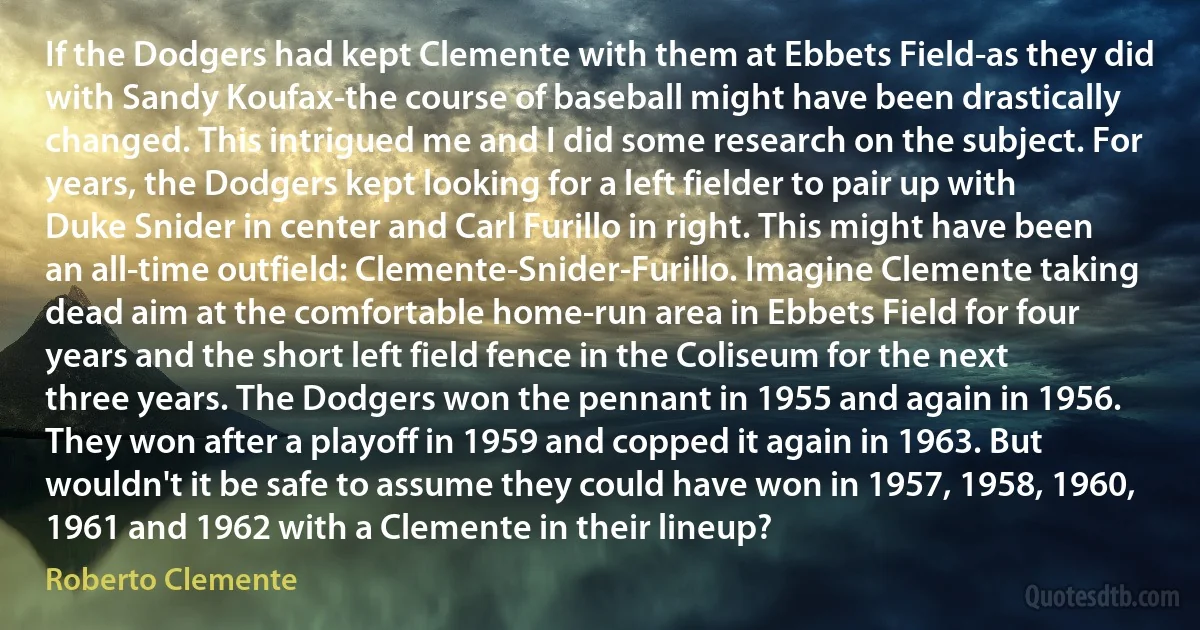
If the Dodgers had kept Clemente with them at Ebbets Field-as they did with Sandy Koufax-the course of baseball might have been drastically changed. This intrigued me and I did some research on the subject. For years, the Dodgers kept looking for a left fielder to pair up with Duke Snider in center and Carl Furillo in right. This might have been an all-time outfield: Clemente-Snider-Furillo. Imagine Clemente taking dead aim at the comfortable home-run area in Ebbets Field for four years and the short left field fence in the Coliseum for the next three years. The Dodgers won the pennant in 1955 and again in 1956. They won after a playoff in 1959 and copped it again in 1963. But wouldn't it be safe to assume they could have won in 1957, 1958, 1960, 1961 and 1962 with a Clemente in their lineup?
Roberto ClementeRelated topics
aim baseball carl course dead fence field fielder four left looking might next outfield pair pennant research right safe short taking three won years lineup playoffRelated quotes
I do not pretend that I know the whole solution of the world's problems, but I am burdened with a Puritanical sense of obligation to set the world to rights. I feel responsible for many enterprises that are not really my business at all, but many times I have kept silence on issues that interested me deeply through the fear that others would be blamed for my opinions. I have never been willing to believe that human nature cannot be changed; but even if it cannot, I am sure it can be curbed and led into channels of usefulness. I believe that life, not wealth, is the aim of existence - life including all its attributes of love, happiness, and joyful labour. I believe war is the inevitable fruit of our economic system, but even if I am wrong I believe that truth can lose nothing by agitation but may gain all.

Helen Keller
WHAT HAPPENS AFTER DEATH?
When a human soul goes out of the body, some great mystery happens. For if it is guilty of sins, then there come hordes of demons, evil angels and dark forces, take that soul and drag it to their side.
No one should be surprised at that, because if a man surrendered and fell prey to them while still alive in this world, will not they have even greater control over him and enslave him when he departs from this world?
As for the other, the better part of people, something different happens to them. There are Angels around the holy servants of God in this life; the holy spirits surround them and protect them; and when their souls are separated from the body, the choir of Angels welcomes them into their fellowship, into a bright life, and thus leads them to the Lord.

Macarius of Egypt
I was like a gravedigger while I painted these corpses [of the dead Baader-Meinhoff members]. It was just work. If I felt one of them looked too theatrical, I painted over it... I was afraid more of the reaction on the left than the right. It was still very dangerous to deal with this subject in Germany. There was fear that the museum where I showed them might be bombed. All my friends were on the left, but I was not. They said: 'Someone with the right mentality could do this, but not Richter - he is too bourgeois. He steals Baader-Meinhof away from us.' To me, they were part of the problem. I was standing outside watching how people, on both sides [left / right], ignored the truth because of their beliefs, beliefs that made them crazy. That was the point of the pictures.

Gerhard Richter
In every field there is a need for writing where the main objective is to extend the reader's field of acquaintance with the complex cases of the real world. Such writing does not have to be very exact or quantitative; it does not even have to formulate or to demonstrate hypotheses. It constitutes, as it were, travel over the field of study. Travel is certainly not enough, even for a geographer, but we would feel, I imagine, that a geographer who had never travelled would be under a serious handicap. Similarly the student of organizations who has never, even vicariously through reading, been in a hospital, a bank, a research laboratory, a large corporation, a Soviet factory, a revolution, an Egyptian civil service department, and so on, has missed something. His generalizations are apt to be based on too narrow a selection of the field.

Kenneth Boulding
Darrall Imhoff, who as a 6-foot-10 rookie center for the New York Knicks had the misfortune of guarding Chamberlain during his 100-point game in 1962, said, "I spent 12 years in his armpits, and I always carried that 100-point game on my shoulders. "After I got my third foul, I said to one of the officials, Willy Smith, 'Why don't you just give him 100 points and we'll all go home?' Well, we did." Two nights later, at Madison Square Garden, Chamberlain tried to go for the century mark again. But Imhoff 'held' him to 54 points. The fans gave Imhoff a standing ovation. "He was an amazing, strong man," Imhoff said. "I always said the greatest record he ever held wasn't 100 points, but his 55 rebounds against Bill Russell. Those two players changed the whole game of basketball. The game just took an entire step up to the next level."

Wilt Chamberlain
